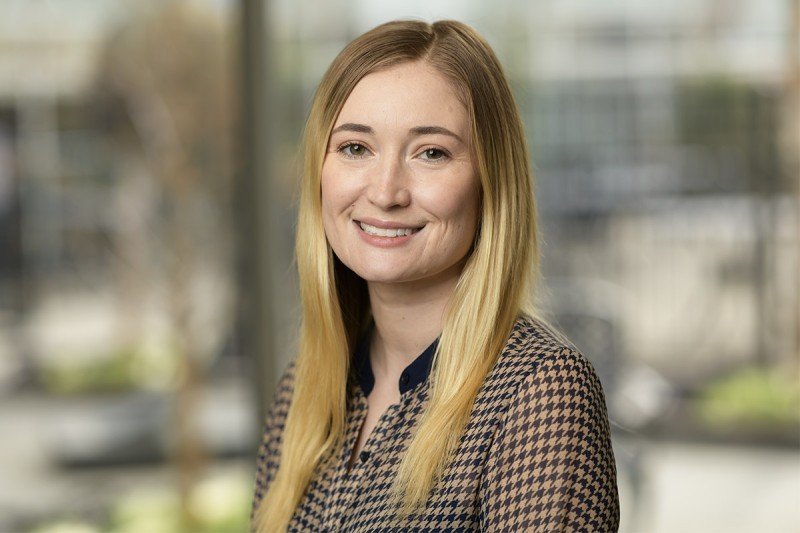
Paige Arnold, a graduate student in the Gerstner Sloan Kettering Graduate School of Biomedical Sciences (GSK), is one of 13 PhD candidates selected from around the world to receive a Harold M. Weintraub Graduate Student Award for the quality, originality, and significance of their doctoral research. The prize, awarded by the Fred Hutchinson Cancer Research Center in Seattle, recognizes outstanding achievement in graduate studies in the biological sciences.
Her thesis was lauded for shedding light on the different strategies that cells use to support their growth and proliferation. These processes are required for normal cell development as well as abnormal cell development, which can lead to diseases like cancer.
Ms. Arnold conducted her research in the Sloan Kettering Institute laboratory of her mentor, cell biologist Lydia Finley, whose research focuses on the mechanisms that link metabolic pathways to cell fate decisions.
“Paige’s graduate work is truly outstanding and has revised our perspective on how metabolic pathways are wired in normal and malignant cells,” says Dr. Finley, who nominated Ms. Arnold for the Weintraub Award. “Paige deserves enormous credit for spearheading this work, which is original, significant, and highly deserving of this recognition.”
A Critical Piece of a Cell’s Identity
Ms. Arnold’s thesis centers on studying cellular metabolism, or how cells make energy and accumulate the raw materials that they need to grow and divide.
In the first half of the 20th century, Sir Hans Aldolf Krebs discovered a metabolic pathway called the tricarboxylic acid (TCA) cycle that is responsible for several core functions in proliferating cells, including the production of energy and the generation of building blocks required for cell growth, such as proteins, lipids, and nucleic acids. Since the discovery of that pathway, scientists have begun to realize that TCA cycle activity is not one size fits all. For example, different cells can use different nutrients to fuel the TCA cycle.
Ms. Arnold was intrigued by this variability in TCA cycle activity. “This was interesting because it suggested that there wasn’t just one way to wire the TCA cycle and that perhaps we were missing something fundamental about how cells support growth and cell division,” she says.
Ms. Arnold’s research went on to identify a novel alternative TCA cycle pathway that is used by both normal cells and cancer cells. She found that blocking cells from engaging in this new cycle severely disrupted TCA cycle metabolism. “We also found that it’s important for a cell to be able to engage in its appropriate or preferred TCA cycle pathway to transition from one cell type to another,” she explains. “In other words, TCA cycle behavior is an intrinsic component of a cell’s identity.”
Dr. Finley adds: “Collectively, her results clearly delineate a previously unappreciated biochemical pathway that serves as an effective alternative to the TCA cycle, and show how appropriate metabolic wiring is a required component of effective cell state changes.”
A Scientist in the Making
Ms. Arnold has been interested in science since the age of 5. As a child growing up in South Florida, she enjoyed nature and the plants and animals that surrounded her home. Her favorite pastime was experimenting with a microscope kit that her mom, a teacher, gave to her.
Her curiosity and desire to better understand the world around her led her to major in biology at Duke University. She also took part in GSK’s Summer Undergraduate Research Program (SURP). She loved the program and living in New York City, and it was not long before she decided to pursue a PhD at GSK.
“I was impressed with the wide array of research being done here — from basic research to translational research that’s directly applicable to patients at the hospital,” she says. “GSK is also smaller and student-driven, and unlike other graduate programs, the first-year coursework is separate from lab rotations so you can focus on each one individually. That appealed to me.”
Poised for Success
Ms. Arnold has worked hard to realize her childhood dream of becoming a scientist, and she is now poised to defend her doctoral thesis in May. “I’m on an academic career path … I’d eventually like to run my own lab and participate in teaching and mentoring the next generation of scientists,” says Ms. Arnold.
An accolade like the Weintraub Award speaks to her potential. “When you look at previous winners, you see that many run their own labs now and are leaders in their respective fields,” says Ms. Arnold. “I’m honored to be a part of that group and have my research recognized in this special way.”
Dr. Finley is confident about Ms. Arnold’s future success. “Paige is an excellent scientist and she has become an expert in cell metabolism over the past several years,” she says. “Her ability to synthesize knowledge and her dedication to truly understanding her results has allowed her to convert intriguing observations into an outstanding thesis, and will propel her to make important discoveries throughout her career.”
